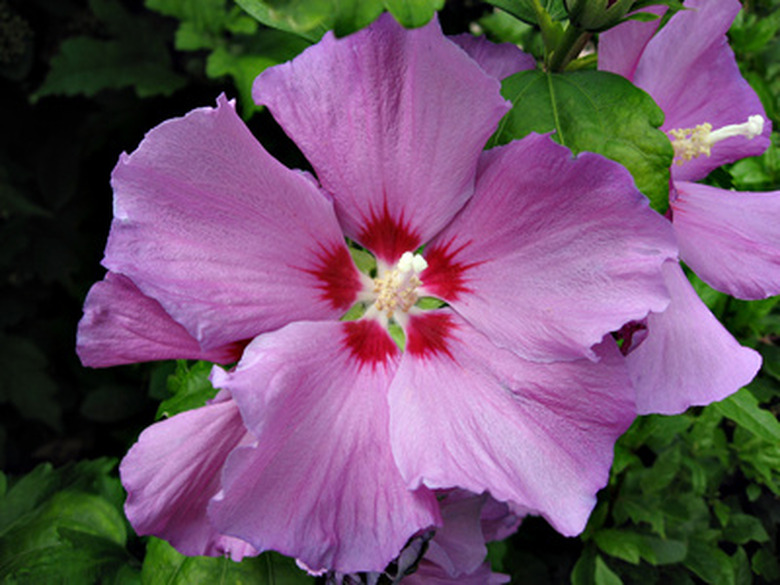Rose Of Sharon Toxicity
We may receive a commission on purchases made from links.
The rose of Sharon is a flowering shrub that can brighten a garden. It's often reported that this plant, known scientifically as Hibiscus syriacus, is toxic to dogs, but those toxicity reports seem to be anecdotal, and the American Society for the Prevention of Cruelty to Animals (ASPCA) states that rose of Sharon is nontoxic to dogs, cats and horses.
Identification of Rose of Sharon
Identification of Rose of Sharon
The rose of Sharon is a perennial plant in U.S. Department of Agriculture plant hardiness zones 5 through 9. It typically grows to a height of 8 to 12 feet and has a spread of 6 to 10 feet. The shrub blooms from midsummer to summer's end, typically during the months of July through September. The rose of Sharon shrub originated in Asia and is now found widely in many gardens across the United States.
Blooms may be pink, red, lavender, white or light blue. The flowers are approximately 3 inches wide and are either single or double. The rose of Sharon has a sturdy, treelike trunk and leaves that are about 4 inches wide and bright green in color.
Is Rose of Sharon Toxic?
Is Rose of Sharon Toxic?
In its list of toxic plants, AR Agriculture lists rose of Sharon and similar hibiscus shrubs as being in toxicity category 4, meaning it's generally nontoxic to humans. Although this source states nothing about animals, the ASPCA reports extensive lists of plants that are toxic to dogs, cats and horses, and rose of Sharon is not on any of these lists. Instead, it's specifically identified as nontoxic to dogs, cats and horses.
Toxic vs. Nontoxic
Toxic vs. Nontoxic
There are a fair number of plants that are toxic to animals. The ASPCA provides a comprehensive list of toxic and nontoxic plants for dogs, cats and horses. The most common plants that are toxic to dogs, cats and horses are sago palm (Cycas revoluta), tulips (Tulipa spp.), azaleas (Rhododendron spp.) and lilies (Lilium spp.).
All of the plants the ASPCA lists as toxic are reported as having systemic effects on animals or intense gastrointestinal effects. However, the ASPCA states that it's not a good idea for pets to ingest any plant material, including rose of Sharon, as any plant consumed in a large quantity may cause vomiting and stomach distress.
The difference is that plants listed as nontoxic or having potential toxicity with only mild stomach upset aren't expected to be life-threatening to pets, the ASPCA says. Any time you think your pet may have eaten something that's causing stomach upset or unusual behavior, it's a good idea to call your vet, your local animal emergency hospital or the ASPCA 24-hour poison hotline at 1-888-426-4435.
Tips and Prevention
Tips and Prevention
If a pet has consumed too much rose of Sharon or another plant and is vomiting or experiencing diarrhea, collect a sample of your pet's vomit and bring it with you to your vet's office or the animal emergency hospital. Also, collect any evidence of what the pet has chewed.
The easiest way to avoid potential illness caused by animals consuming any plant material is to prune your rose of Sharon and keep watch over your pet if your pet is prone to chewing leaves or flowers.
Keeping this plant pruned so that the branches are out of reach of animals is strongly suggested. Promptly raking up any fallen buds, blossoms or leaves can help avoid illness in pets as well. Remember to get permission from neighbors before cutting any foliage that originates from their yard.
References
- American Society for the Prevention of Cruelty to Animals: Toxic and Non-Toxic Plants List
- Humane Society of Charlotte: 7 Surprisingly Common Plants That Are Poisonous to Pets
- AR Agriculture: List of Toxic Plants
- Michigan State University Veterinary Diagnostic Laboratory: Pet and Poison Control: Making Your Home Safer
- Missouri Botanical Garden: Hibiscus syriacus
- Missouri Botanical Garden: Cycas revoluta
- NC State Extension: Tulipa
- University of Wisconsin Extension: Milwaukee County: Rhododendrons & Azaleas (Rhododendron spp.)
- NC State Extension: Lilium
